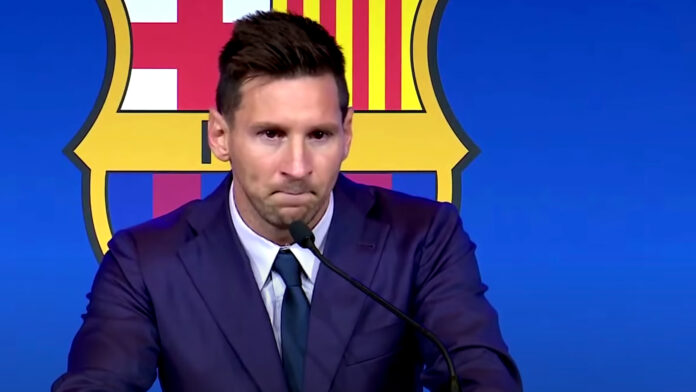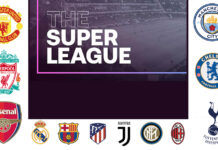My reaction to Lionel Messi’s tearful farewell to Barcelona yesterday was to point the finger at Catalan’s Argentinian icon, and challenge him to take his share of the blame for virtually bankrupting the club he says he loves.
While some point to rules that appear to have made Messi’s departure inevitable, I believe the overwhelming reaction was agreement with my declaration that he should now find a way to effectively “play for free” if he really loves the club.
How much money does one man need? And was the pursuit of money really worth pushing Barcelona into such a precarious position?
There is an old adage that no player is bigger than the club. But FC Barcelona risked everything by ignoring that sacred mantra. Messi may be their their greatest ever player, but their blind faith in him has threatened the very future of the institution that proudly claims it is “Mes Que Un Club”… more than a club.
What’s interesting about this whole drama is how greed and the failure to foresee the financial turmoil that now surrounds FC Barcelona has combined to create a crisis with potentially seismic consequences for Spanish football.
Back in January of this year the world’s media reported that Barca was “on the verge of bankruptcy” and unable to pay in full the wages of Messi and his team mates. The club had amassed staggering debts of more than one billion euros and while covid accelerated their cashflow crisis it was by no means the sole reason for this catastrophic scenario.
Barcelona have spent years pouring hundreds of millions of euros into Messi’s bank accounts, and that insane level of spending was simply unsustainable.
Messi’s wages in the four years to June this year – when his contract expired – totalled over 555 million euros according to a leak by El Mundo newspaper
When you consider that around 50% of FC Barcelona’s debts have been paid in wages to Messi since 2017, it is clear this is spending they could not afford.
If Messi’s love for the club is greater than his love for money, surely this time round he could have retained his image and commercial rights in lieu of actual wages. Or a deal could have been structured where he reinvested his salary into the club as a sponsor or shareholder. When the alternative is for Spanish football’s biggest asset to leave the country, I am sure it is not beyond the wit of man to find a solution. Remember all sides agreed they wanted Messi to stay.
But all parties are now blaming the rules which state that La Liga clubs can’t spend more than 70% of their revenue on wages. Without Messi the wage bill at Camp Nou will still be 95% of income and it stood at 115% even after their talisman agreed to take a 50% paycut. Spanish law also prevents a new contract from being less than 50% of the previous one.
So there were hurdles to overcome at every turn. And Barcelona’s problems don’t stop here. Their financial issues, along with La Liga’s rules, mean they might not even be able to register new signings Memphis Depay, Sergio Aguero, Eric Garcia and Emerson. Aguero was today ruled out for 10 weeks with a tendon injury that will delay his registration giving Barca financial breathing space. But it’s hardly positive news.
The truth is that trying to outcompete rivals Real Madrid, Barcelona have been recruiting the world’s top players by spending money they can’t afford. And they have not always spent wisely. The 160 million euros forked out for Liverpool’s Philippe Coutinho three years ago was their biggest miscalculation.
But the problem with spending like there’s no tomorrow is that eventually tomorrow does arrive. And here we are.
Meantime, Real Madrid have also had their dominance in the transfer market challenged. Unable to retain the services of their legendary skipper Sergio Ramos, Los Blancos have also sold Raphael Varane to Manchester United for a cut-price deal.
Real Madrid have never been the same offensively since offloading their greatest ever goalscorer Cristiano Ronaldo in the summer of 2018.
The drop in revenue for both clubs over the past 18 months has been exacerbated by a disappointing return from some of their biggest signings. Eden Hazard has been a mere shadow of his former Chelsea self since arriving in Madrid. And Gareth Bale is back from his loan spell at Spurs where a large chunk of his 600,000K per week wages were still being paid by his parent club when he was in North London.
We all know that Real Madrid and Barcelona’s desperation to launch the aborted European Super League was fuelled by the need to keep up with the Premier League giants who are growing in financial strength. Like their rivals from Madrid, the Catalans have yet to distance themselves from the idea of reviving the breakaway league.
Meantime, Barcelona and Real Madrid are both at odds with La Liga over their wish to sell 10% of the League’s commercial rights to private equity firm CVC Capital Partners for 2.7 billion euros. Interestingly this deal was announced the day before it emerged Messi was not staying at Barcelona.
It’s an opportunist attempt to seize control of a big slice of the Spanish broadcasting rights for the next 50 years. And it comes at a time when the El Classico rivals are financially vulnerable. Their share of the windfall would certainly solve short term cashflow issues.
Meantime, Spain is being outmuscled by English clubs in the transfer market.
Premier League giants Manchester City have splashed out a record 100 million pounds for Jack Grealish and still pursue the even more expensive Harry Kane. While Manchester United have already spent nearly 120 million on Jadon Sancho and Varane this summer.
It will be interesting to look back in the years ahead and assess whether or not the departures of Messi and Ronaldo signalled the end of Spain’s dominance.
JOHN GUBBA
Messi left his native Argentina for Spain when he was 13 and made his first-team debut for Barcelona aged 17 in October, 2004. He scored 672 goals in 778 games at Barca and helped the Spanish giants win 34 trophies. His silverware includes10 La Liga titles and four Champions Leagues. He’s won a record six Ballons d’Or. The only player to have scored more than 40 goals in 10 consecutive seasons.
Ronaldo’s career tally of 30 club trophies spans Sporting Lisbon, Manchester United, Real Madrid and Juventus. For Los Blancos he averaged over a goal a game netting a club record 451 times in just 438 appearances.He won four Champions Leagues with Madrid to add to the one he won with the Red Devils and has five Ballons d’Or. The only player to score more than 50 goals in six consecutive seasons.


















